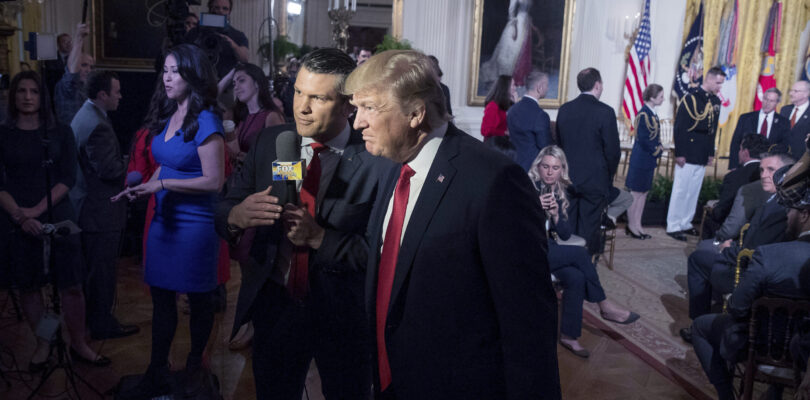Leaders of nonprofits that have advocated for stronger polices to bolster diversity in the military and keep extremists out of the ranks are now concerned that President-elect Donald Trump and his pick for defense secretary will quickly work to undo those measures.
Trump announced Nov. 12 he intended to nominate Army veteran and conservative commentator Pete Hegseth as his next secretary of defense. Hegseth has compared the Pentagon’s extremism policies to a “purge,” said he wants to fire “woke” military leaders and doesn’t believe women should serve in combat roles.
Members of Protect our Defenders and Human Rights First have advocated for stronger diversity and anti-extremism policies within the Defense Department, such as required training for troops about prohibited extremist activities and gender-affirming health care for service members. Now, they expect that Trump and Hegseth will work with their allies in Congress to roll back those policies and others.
“The individual who President-clect Trump has tapped to be the next Secretary of Defense – it seems like he’s very much trying to unwind those policies,” said Josh Connolly, senior vice president of Protect Our Defenders. “It seems like he has a very clear bias to dismantle efforts to address these issues.”
Women in combat ‘proficient,’ SecDef says, dismissing calls for change
Hegseth targets ‘woke’ initiatives
On a podcast interview that aired two days after the election, Hegseth said the Pentagon’s focus on diversity, equity and inclusion, or DEI, erodes military values.
“The dumbest phrase on planet Earth in the military is ‘Our diversity is our strength,’” Hegseth said.
Hegseth, if he’s confirmed to lead the Pentagon, is likely to have allies in Congress in his effort to strip away those programs. Some GOP lawmakers, including Rep. Jim Banks, R-Ind., who sits on the House Armed Services Committee, have vowed to expunge “wokeism” from the military, referring to what they see as a rise in radically progressive policies at the Pentagon.
Opposition to the Pentagon’s diversity, equity and inclusion efforts, or DEI, has spiked among select conservative lawmakers since 2020, when Congress expanded such programs and mandated the Defense Department’s hiring of a chief diversity officer, said Liz Yates, an associate director with Human Rights First.
Since then, some lawmakers have attempted to dismantle the programs. Congress is currently considering the annual defense authorization bill for 2025, a large legislative package that determines military spending. Both the House and Senate versions of the bill contain several provisions that limit the Pentagon’s diversity initiatives, including one that would eliminate all diversity, equity and inclusion offices. Nine veteran and military organizations wrote a letter to lawmakers opposing the measures.
Congress considers ‘very severe rollback’ of military’s DEI programs
Opponents of the Pentagon’s DEI programs claim they harm recruitment efforts by deterring people with conservative views. Those who support the programs argue they can improve recruitment by showing would-be recruits that the military doesn’t tolerate discrimination.
According to a study published in 2021 by Blue Star Families, a nonprofit that supports military families and veterans, about 30% of service members identify as minorities. By 2027, most recruitable adults in the United States will be people of color, the study said. National security experts have increasingly viewed women, too, as having an important role to play in reversing the military’s recruitment woes.
“This is something that has just been incredibly politicized, when in reality these are the kinds of programs that have been supported by people throughout the services who see them as useful to the mission of trying to create a more lethal force and improve recruitment,” Yates said.
Little evidence exists, meanwhile, that DEI initiatives play much of a role in recruitment. The Pentagon’s Inspector General reported last year that the majority of would-be recruits are not enlisting because of fear of death in combat, having grown up hearing about casualties in Iraq and Afghanistan. There is also increased competition between the military and the private sector for top talent, and private companies offer higher pay on average, the report states.

A ‘full-court press’ to undo extremism prevention
In his book, “War on Warriors,” Hegseth downplayed the role of service members in the Jan. 6, 2021, attack on the U.S. Capitol, and he argued that military leaders remain distracted by efforts to root out extremism from the ranks.
His opposition to the Pentagon’s anti-extremism efforts is partly personal, he revealed on the podcast interview Nov. 7. During the interview, he said he had been removed from National Guard duty at President Joe Biden’s inauguration in 2021 because of a tattoo. The Associated Press reported that a fellow service member flagged Hegseth as an “insider threat” because one of his tattoos was associated with the white supremacist movement.
If Hegseth becomes the Secretary of Defense, the agency will likely “put their head in the sand” on the issue of extremism, Connolly said.
When it became known that some service members were part of the riot at the U.S. Capitol on Jan. 6, 2021, Defense Secretary Lloyd Austin ordered a military-wide stand down against extremism. During the past four years, the Justice Department has charged 24 service members and 198 veterans for their participation in the riot, according to data from the National Consortium for the Study of Terrorism and Responses to Terrorism, known as START.
Recent research by START revealed that the number of violent extremists among the veteran and military population is small, but the group has an outsized impact once radicalized. From 1990 through 2022, 451 people with military backgrounds committed extremist offenses. Of those, 170, or nearly 38%, either plotted or followed through with a deadly terrorist attack, the research shows.
Military service key factor in 3 decades of extremist attacks
To address extremism in the ranks, the Pentagon updated its definition of prohibited extremist activities. This summer, each service branch adopted new rules to ensure troops are trained about those off-limits activities and require commanders to act when they spot extremism in their units. A law passed by Congress in 2021 mandates the services to report allegations of extremism to the Inspector General’s Office – a process the Pentagon has been working to streamline over the past few years.
U.S. Army Secretary Christine Wormuth said that extremist activities “damage the nation’s trust and confidence in the Army as an institution,” “undermine morale” and “reduce combat readiness.”
Liz Yates, the associate director at Human Rights First, said she expected Trump to launch a “full-court press” to undo the new measures.
“It’s taken a lot of advocacy and it had been a long road, but we had seen some progress,” Yates said. “We’re concerned about that progress halting with this new administration. We expect this will be under attack.”
Connolly guessed the rollback of anti-extremism policies would have a negative effect on recruitment.
“The prevailing majority of individuals that serve in our military are not extremists, and if there’s a complicity or acceptance of extremist attitudes and behaviors, that does not produce an environment people want to serve in,” Connolly said.
There are already efforts underway in Congress to end the Pentagon’s focus on extremism. The annual defense authorization bill for 2025 includes a measure that prohibits leaders from using defense dollars on extremism-prevention efforts that were recommended by the Countering Extremist Activity Working Group. Lawmakers are expected to work on the bill in December.
This story was produced in partnership with Military Veterans in Journalism. Please send tips to MVJ-Tips@militarytimes.com.



